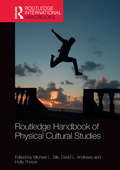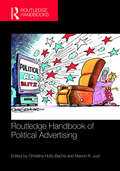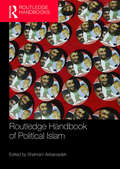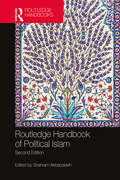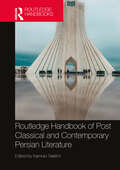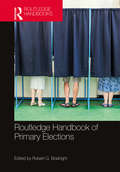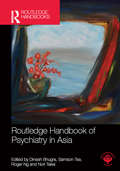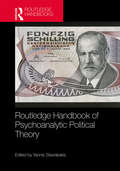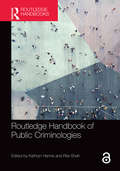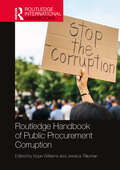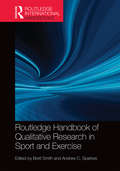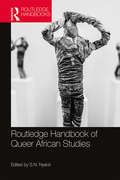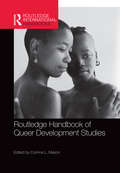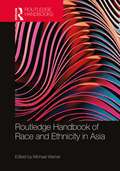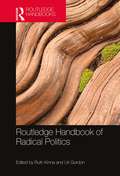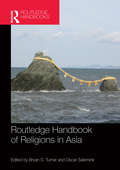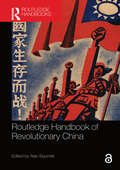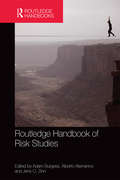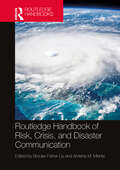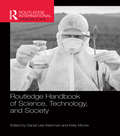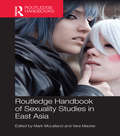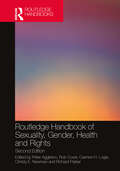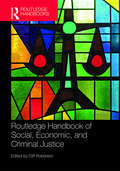- Table View
- List View
Routledge Handbook of Physical Cultural Studies (Routledge International Handbooks)
by David L. Andrews Holly Thorpe Michael L. SilkPhysical cultural studies (PCS) is a dynamic and rapidly developing field of study. This handbook offers the first definitive account of the state of the art in PCS, showcasing the latest research and methodological approaches. It examines the boundaries, preoccupations, theories and politics of PCS, drawing on transdisciplinary expertise from areas as diverse as sport studies, sociology, history, cultural studies, performance studies and anthropology. Featuring chapters written by world-leading scholars, this handbook examines the most important themes and issues within PCS, exploring the active body through the lens of class, age, gender, sexuality, race, ethnicity, (dis)ability, medicine, religion, space and culture. Each chapter provides an overview of the state of knowledge in a particular subject area, while also considering possibilities for developing future research. Representing a landmark contribution to physical cultural studies and allied fields, the Routledge Handbook of Physical Cultural Studies is an essential text for any undergraduate or postgraduate course on physical culture, sports studies, leisure studies, the sociology of sport, the body, or sport and social theory.
Routledge Handbook of Political Advertising (Routledge International Handbooks)
by Marion R. Just Christina Holtz-BachaThis Handbook provides the most comprehensive overview of the role of electoral advertising on television and new forms of advertising in countries from all parts of the world currently available. Thematic chapters address advertising effects, negative ads, the perspective of practitioners and gender role. Country chapters summarize research on issues including political and electoral systems; history of ads; the content of ads; reception and effects of ads; regulation of political advertising on television and the Internet; financing political advertising; and prospects for the future. The Handbook confirms that candidates spend the major part of their campaign budget on television advertising. The US enjoys a special situation with almost no restrictions on electoral advertising whereas other countries have regulation for the time, amount and sometimes even the content of electoral advertising or they do not allow television advertising at all. The role that television advertising plays in elections is dependent on the political, the electoral and the media context and can generally be regarded as a reflection of the political culture of a country. The Internet is relatively unregulated and is the channel of the future for political advertising in many countries
Routledge Handbook of Political Islam
by Shahram AkbarzadehThe Routledge Handbook of Political Islam provides a multidisciplinary overview of the phenomenon of political Islam, one of the key political movements of our time. Drawing on the expertise from some of the top scholars in the world it examines the main issues surrounding political Islam across the world, from aspects of Muslim integration in the West to questions of political legitimacy in the Muslim world. Bringing together an international team of renowned and respected experts on the topic, the chapters in the book present a critical account of: Theoretical foundations of political Islam Historical background Geographical spread of Islamist movements Political strategies adopted by Islamist groups Terrorism Attitudes towards democracy Relations between Muslims and the West in the international sphere Challenges of integration Gender relations. Presenting readers with the diversity of views on political Islam in a nuanced and dispassionate manner, this handbook is an essential addition to the existing literature on Islam and politics. It will be of interest across a wide range of disciplines, including political science, Islamic studies, sociology and history.
Routledge Handbook of Political Islam
by Shahram AkbarzadehThis updated, second edition of the Handbook of Political Islam covers a range of political actors that use Islam to advance their cause. While they share the ultimate vision of establishing a political system governed by Islam, their tactics and methods can be very different. Capturing this diversity, this volume also sheds light on some of the less-known experiences from South East Asia to North Africa. Drawing on expertise from some of the top scholars in the world, the chapters examine the main issues surrounding political Islam across the world, including: Theoretical foundations of political Islam Historical background Geographical spread of Islamist movements Political strategies adopted by Islamist groups Terrorism Attitudes towards democracy Relations between Muslims and the West in the international sphere Challenges of integration Gender relations Capturing the geographical spread of Islamism and the many manifestations of this political phenomenon make this book a key resource for students and researchers interested in political Islam, Muslim affairs and the Middle East.
Routledge Handbook of Post Classical and Contemporary Persian Literature
by Kamran TalattofRoutledge Handbook of Post Classical and Contemporary Persian Literature contains scholarly essays and sample texts related to Persian literature from the 17th century to the present day. It includes analyses of free verse poetry, short stories, novels, prison writings, memoirs, and plays. The chapters apply a disciplinary or interdisciplinary approach to the many movements, genres, and works of the long and evolving body of Persian literature produced in the Persianate World. These collections of scholarly essays and samples of Persian literary texts provide facts (general information), instructions (ways to understand, analyze, and appreciate this body of works), and the field’s state-of-the-art research (the problematics of the topics) regarding one of the most important and oldest literary traditions in the world. Thus, the Handbook’s chapters and related texts provide scholars, students, and admirers of Persian poetry and prose with practical and direct access to the intricacies of the Persian literary world through a chronological account of key moments in the formation of this enduring literary tradition. The related Handbook (also edited by Kamran Talattof ), Routledge Handbook of Ancient, Classical, and Late Classical Persian Literature covers Persian literary works from the ancient or pre-Islamic era to roughly the end of the 16th century.
Routledge Handbook of Primary Elections
by Robert G. BoatrightPrimary elections have been used for the past century for most U.S. elective offices and their popularity is growing in other nations as well. In some circumstances, primaries ensure that citizens have a say in elections and test the skills of candidates before they get to the general election. Yet primaries are often criticized for increasing the cost of elections, for producing ideologically extreme candidates, and for denying voters the opportunity to choose candidates whose appeal transcends partisanship. Few such arguments have, however, been rigorously tested. This innovative Handbook evaluates many of the claims, positive and negative, that have been made about primaries. It is organized into six sections, covering the origins of primary elections; primary voters; US presidential primaries; US subpresidential primaries; primaries in other parts of the world; and reform proposals. The Routledge Handbook of Primary Elections is an important research tool for scholars, a resource guide for students, and a source of ideas for those who seek to modify the electoral process.
Routledge Handbook of Psychiatry in Asia
by Dinesh Bhugra Samson Tse Roger Ng Nori TakeiGeographically and demographically Asia is a huge region with a large number of societies and cultures, each affected by their own unique problems including over-population, major natural disasters, poverty and changing social and economic factors. Inevitably this means that different mental health needs have developed across the region. Colonialism, globalization, industrialization and urbanization have brought major demographic and cultural shifts in the region but clinical mental health practices and services and societal attitudes to mental health issues vary enormously. This handbook surveys the state of the current psychiatric care field across the whole Asia-Pacific region. Focusing on individual countries, each chapter will include: A summary of factors affecting the practice and provision of psychiatric care, including cultural attitudes to mental health issues Coverage of the conceptualisation, causation and prevalence of mental health issues in society An overview of mental health care services and systems available and workforce training Coverage of country specific innovative practices and folk therapies As the first major reference work on psychiatric care in Asia this book is an essential resource for scholars and students researching mental health in Asia as well as psychiatrists and other mental health professionals working in the region.
Routledge Handbook of Psychoanalytic Political Theory
by Yannis StavrakakisThe emerging field of psychoanalytic political theory has now reached a stage in its development and rapid evolution that deserves to be registered, systematically defined, and critically evaluated. This handbook provides the first reference volume which showcases the current state of psychoanalytic political theory, maps the genealogy of its development, identifies its conceptual and methodological resources, and highlights its analytical innovations as well as its critical promise. The handbook consists of 35 chapters, offering original, comprehensive, and critical reviews of this field of study. The chapters are divided into five thematic sections: • The figures section discusses the work of major psychoanalytic theorists who have considerably influenced the development of psychoanalytic political theory. • The traditions section genealogically recounts and critically reassesses the many attempts throughout the 20th century of experimenting with the articulation between psychoanalysis and political theory in a consistent way. • The concepts section asks what are the concepts that psychoanalysis offers for appropriation by political theory. • The themes section presents concrete examples of how psychoanalytic political theory can be productively applied in the analysis of racism, gender, nationalism, consumerism, and so on. • The challenges/controversies section captures how psychoanalytic political theory can lead the way towards theoretical and analytical innovation in many disciplinary fields that deal with cutting-edge issues. The Routledge Handbook of Psychoanalytic Political Theory will serve as a scholarly reference volume for all students and researchers studying political theory, psychoanalysis, and the history of ideas.
Routledge Handbook of Psychoanalytic Political Theory
by Yannis StavrakakisThe emerging field of ‘psychoanalytic political theory’ has now reached a stage in its development and rapid evolution that deserves to be registered, systematically defined and critically evaluated. This Handbook provides the first reference volume which showcases the current state of psychoanalytic political theory, maps the genealogy of its development, identifies its conceptual and methodological resources and highlights its analytical innovations as well as its critical promise. The Handbook consists of 35 chapters offering original, comprehensive and critical reviews of this field of study. The chapters are divided into five thematic sections: Figures discusses the work of major psychoanalytic theorists who have influenced considerably the development of psychoanalytic political theory. Traditions genealogically recounts and critically reassesses the many attempts throughout the 20th century of experimenting with the articulation between psychoanalysis and political theory in a consistent way. Concepts asks what are the concepts that psychoanalysis offers for appropriation by political theory. Themes presents concrete examples of the ways in which psychoanalytic political theory can be productively applied in the analysis of racism, gender, nationalism, consumerism, etc. Challenges/Controversies captures the ways in which psychoanalytic political theory can lead the way towards theoretical and analytical innovation in many disciplinary fields dealing with cutting-edge issues. The Routledge Handbook of Psychoanalytic Political Theory will serve as scholarly reference volume for all students and researchers studying political theory, psychoanalysis, and the history of ideas.
Routledge Handbook of Public Criminologies (Routledge International Handbooks)
by Rita Shah Kathryn HenneFeaturing contributions from scholars from across the globe, Routledge Handbook of Public Criminologies is a comprehensive resource that addresses the challenges related to public conversations around crime and policy. In an era of fake news, misguided rhetoric about immigrants and refugees, and efforts to toughen criminal laws, criminologists seeking to engage publicly around crime and policy arguably face an uphill battle. This handbook outlines the foundations of and developments in public criminology, underscoring the need to not only understand earlier ideas and debates, but also how scholars pursue public-facing work through various approaches. The first of its kind, this collection captures diverse and critical perspectives on the practices and challenges of actually doing public criminology. The book presents real-world examples that help readers better understand the nature of public criminological work, as well as the structural and institutional barriers and enablers of engaging wider audiences. Contributors address policies around crime and crime control, media landscapes, and changing political dynamics. In examining attempts to bridge the gaps between scholarship, activism, and outreach, the essays featured here capture important tensions related to inequality and social difference, including the ways in which criminology can be complicit in perpetuating inequitable practices and structures, and how public criminology aims—but sometimes fails—to address them. The depth and breadth of material in the book will appeal to a wide range of academics, students, and practitioners. It is an important resource for early career researchers, more established scholars, and professionals, with accessible content that can also be used in upper-level undergraduate classes.
Routledge Handbook of Public Procurement Corruption (Routledge International Handbooks)
by Sope Williams Jessica TillipmanThe Routledge Handbook of Public Procurement Corruption showcases the most innovative and exciting research being conducted in this important area of study, providing a comprehensive go-to reference for all who are interested in the topic.During the COVID-19 pandemic, the global race for health and ancillary goods amid global supply chain disruptions demonstrated that, when tested, all countries are incredibly vulnerable to fraud and corruption in public procurement, irrespective of their level of development. Yet despite the widespread nature of the problem, there remains a lack of in-depth, analytical, and cross-country investigations into public procurement corruption. This book addresses this gap by providing a comprehensive, multidisciplinary, geographically balanced treatise on corruption in public procurement. It combines country-specific studies to allow readers to easily compare differing perspectives and approaches and overarching thematic chapters to reflect on new and cutting-edge issues in procurement and their implications for procurement corruption. Key sectors such as healthcare and infrastructure are considered, as well as the role of new technologies, in both combatting and enabling procurement corruption.This Handbook provides academics, practitioners, and graduate researchers of public administration, law, and anti-corruption with all of the tools they need to understand the nuances of public procurement corruption around the world.
Routledge Handbook of Qualitative Research in Sport and Exercise (Routledge International Handbooks)
by Andrew C. Sparkes Brett SmithThe last two decades have witnessed a proliferation of qualitative research in sport and exercise. The Routledge Handbook of Qualitative Research in Sport and Exercise is the first book to offer an in-depth survey of established and emerging qualitative methods, from conceptual first principles to practice and process. Written and edited by a team of world-leading researchers, and some of the best emerging talents, the book introduces a range of research traditions within which qualitative researchers work. It explores the different methods used to collect and analyse data, offering rationales for why each method might be chosen and guidance on how to employ each technique successfully. It also introduces important contemporary debates and goes further than any other book in exploring new methods, concepts, and future directions, such as sensory research, digital research, visual methods, and how qualitative research can generate impact. Cutting-edge, timely and comprehensive, the Routledge Handbook of Qualitative Research in Sport and Exercise is an essential reference for any student or scholar using qualitative methods in sport and exercise-related research.
Routledge Handbook of Queer African Studies
by S. N. NyeckThis handbook offers diverse perspectives on queer Africa, incorporating scholarly contributions on themes that reflect and inflect the trajectories of queer contributions to African studies within and outside academia. The Routledge Handbook of Queer African Studies incorporates a range of unique perspectives, reflecting ongoing struggles between regimes of inclusion and those of transformation premised upon different relational and reflexive engagements between queer embodiment and Africa’s subjectivities. All sections of this handbook blend contributions from public intellectuals and practitioners with academic reflections on topics not limited to neoliberalism, social care, morality and ethics, social education, and technology, through the lens of queer African studies. The book renders visible the ongoing transformations and resistance within African societies as well as the inventiveness of queer presence in negotiating belonging. This handbook will be of interest to students and scholars of gender and sexuality in Africa, queer studies, and African culture and society.
Routledge Handbook of Queer Development Studies (Routledge International Handbooks)
by Corinne L. MasonAround the world lesbian, gay, bisexual, trans, intersex and queer individuals are subjected to violence and intimidation based on their real or perceived sexuality, gender identity or expression. With those most at risk of human rights violations often living in areas of low economic development, questions of sexuality, gender identity, and expression have become a significant area of research within the field of development studies. The Routledge Handbook of Queer Development Studies is the first full length study of queer development studies, collecting the very best in research from around the world. Topics for discussion include: Queering policy and planning in development Queer development critique and queer critiques of development Global LGBTIQ rights Queer social movements and mobilizations At a time when development and human rights organizations such as the World Bank, Office of the UN Secretary General and Human Rights Watch are placing increasing importance on global LGBT rights, the Routledge Handbook of Queer Development Studies is an essential guide for scholars, upper level students, practitioners and anyone with an interest in global sexualities, gender identities, and expressions.
Routledge Handbook of Race and Ethnicity in Asia
by Michael WeinerThe Routledge Handbook of Race and Ethnicity in Asia introduces theoretical approaches to the study of race, ethnicity and indigeneity in Asia beyond those commonly grounded in the Western experience. The volume’s twenty-eight chapters consider not only the relationship between ethnic or racial minorities and the state, but social relations within and between individual and transnational communities. These shape not only the contours of governance, but also the means by which knowledge of national identity, ‘self ’, and ‘other’ have been constructed and reconstructed over time. Divided into four sections, it provides holistic and comparative coverage of South, South East, and East Asia, as well as Australasia and Oceania; an area that extends from Pakistan in the West to Hawai’i in the East. Contributors to this handbook offer a variety of disciplinary and interdisciplinary perspectives, opening a domain of scholarship wherein the relationship between phenotype and racism is less pronounced than European and North American approaches, which have often privileged the so-called ‘colour stigmata’, leading to further exclusions of particular ethnic, racial, and indigenous communities. This volume seeks to overcome racism and white ideologies embedded in theories of race and ethnicity in Asia, proving a valuable resource to both students and scholars of comparative racial and ethnic studies, international relations and human rights.
Routledge Handbook of Radical Politics
by Uri Gordon Ruth KinnaSuccessive waves of global protest since 1999 have encouraged leading contemporary political theorists to argue that politics has fundamentally changed in the last twenty years, with a new type of politics gaining momentum over elite, representative institutions. The new politics is frequently described as radical, but what does radicalism mean for the conduct of politics? Capturing the innovative practices of contemporary radicals, Routledge Handbook of Radical Politics brings together leading academics and campaigners to answer these questions and explore radicalism’s meaning to their practice. In the thirty-five chapters written for this collection, they collectively develop a picture of radicalism by investigating the intersections of activism and contemporary political theory. Across their experiences, the authors articulate radicalism’s critical politics and discuss how diverse movements support and sustain each other. Together, they provide a wide-ranging account of the tensions, overlaps and promise of radical politics, while utilising scholarly literatures on grassroots populism to present a novel analysis of the relationship between radicalism and populism. Routledge Handbook of Radical Politics serves as a key reference for students and scholars interested in the politics and ideas of contemporary activist movements.
Routledge Handbook of Religions in Asia
by Bryan S. Turner and Oscar SaleminkThe Routledge Handbook of Religions in Asia provides a contemporary and comprehensive overview of religion in contemporary Asia. Compiled and introduced by Bryan S. Turner and Oscar Salemink, the Handbook contains specially written chapters by experts in their respective fields. The wide-ranging introduction discusses issues surrounding Orientalism and the historical development of the discipline of Religious Studies. It conveys how there have been many centuries of interaction between different religious traditions in Asia and discusses the problem of world religions and the range of concepts, such as high and low traditions, folk and formal religions, popular and orthodox developments. Individual chapters are presented in the following five sections: Asian Origins: religious formations Missions, States and Religious Competition Reform Movements and Modernity Popular Religions Religion and Globalization: social dimensions Striking a balance between offering basic information about religious cultures in Asia and addressing the complexity of employing a western terminology in societies with radically different traditions, this advanced level reference work will be essential reading for students, researchers and scholars of Asian Religions, Sociology, Anthropology, Asian Studies and Religious Studies.
Routledge Handbook of Revolutionary China
by Alan BaumlerThe Routledge Handbook of Revolutionary China covers the evolution of Chinese society from the roots of the Republic of China in the early 1900s until the end of the Cultural Revolution in 1976. The chapters in this volume explain aspects of the process of revolution and how people adapted to the demands of the revolutionary situation. Exploring changes in political leadership, as well as transformation in culture, it compares the differences in experiences in urban and rural areas and contrasts rapid changes, such as the war with Japan and Communist ‘liberation’ with evolutionary developments, such as the gradual redefinition of public space. Taking a comprehensive approach, the themes covered include: • War, occupation and liberation • Religion and gender • Education, cities and travel. This is an essential resource for students and scholars of Modern China, Republican China, Revolutionary China and Chinese Politics.
Routledge Handbook of Revolutionary China
by Alan BaumlerThe Routledge Handbook of Revolutionary China covers the evolution of Chinese society from the roots of the Republic of China in the early 1900s until the end of the Cultural Revolution in 1976.The chapters in this volume explain aspects of the process of revolution and how people adapted to the demands of the revolutionary situation. Exploring changes in political leadership, as well as transformation in culture, it compares the differences in experiences in urban and rural areas and contrasts rapid changes, such as the war with Japan and Communist ‘liberation’ with evolutionary developments, such as the gradual redefinition of public space. Taking a comprehensive approach, the themes covered include:• War, occupation and liberation• Religion and gender• Education, cities and travel.This is an essential resource for students and scholars of Modern China, Republican China, Revolutionary China and Chinese Politics.
Routledge Handbook of Risk Studies (Routledge International Handbooks)
by Alberto Alemanno Jens Zinn Adam BurgessIt is over 40 years since we began to reflect upon risk in a more social than technological and economic fashion, firstly making sense of the gap between expert and public assessment of risks, such as to our health and environment. With fixed certainties of the past eroded and the technological leaps of ‘big data’, ours is truly an age of risk, uncertainty and probability - from Google’s algorithms to the daily management of personal lifestyle risks. Academic reflection and research has kept pace with these dizzying developments but remains an intellectually fragmented field, shaped by professional imperatives and disciplinary boundaries, from risk analysis to regulation and social research. This is the first attempt to draw together and define risk studies, through a definitive collection written by the leading scholars in the field. It will be an indispensable resource for the many scholars, students and professionals engaging with risk but lacking a resource to draw it all together.
Routledge Handbook of Risk, Crisis, and Disaster Communication
by Brooke Fisher Liu Amisha M. MehtaThis Handbook provides a comprehensive overview of core concepts, research, and practice in risk, crisis, and disaster communication.With contributions from leading academic experts and practitioners from diverse disciplinary backgrounds including communication, disaster, and health, this Handbook offers a valuable synthesis of current knowledge and future directions for the field. It is divided into four parts. Part One begins with an introduction to foundational theories and pedagogies for risk and crisis communication. Part Two elucidates knowledge and gaps in communicating about climate and weather, focusing on community and corporate positions and considering text and visual communication with examples from the US and Australia. Part Three provides insights on communicating ongoing and novel risks, crises, and disasters from US and European perspectives, which cover how to define new risks and translate theories and methodologies so that their study can support important ongoing research and practice. Part Four delves into communicating with diverse publics and audiences with authors examining community, first responder, and employee perspectives within developed and developing countries to enhance our understanding and inspire ongoing research that is contextual, nuanced, and impactful. Offering innovative insights into ongoing and new topics, this handbook explores how the field of risk, crisis, and disaster communications can benefit from theory, technology, and practice.It will be of interest to students, researchers, and practitioners in the fields of disaster, emergency management, communication, geography, public policy, sociology, and other related interdisciplinary fields.
Routledge Handbook of Science, Technology, and Society (Routledge International Handbooks)
by Kelly Moore Daniel Lee KleinmanOver the last decade or so, the field of science and technology studies (STS) has become an intellectually dynamic interdisciplinary arena. Concepts, methods, and theoretical perspectives are being drawn both from long-established and relatively young disciplines. From its origins in philosophical and political debates about the creation and use of scientific knowledge, STS has become a wide and deep space for the consideration of the place of science and technology in the world, past and present. The Routledge Handbook of Science, Technology and Society seeks to capture the dynamism and breadth of the field by presenting work that pushes the reader to think about science and technology and their intersections with social life in new ways. The interdisciplinary contributions by international experts in this handbook are organized around six topic areas: embodiment consuming technoscience digitization environments science as work rules and standards This volume highlights a range of theoretical and empirical approaches to some of the persistent – and new – questions in the field. It will be useful for students and scholars throughout the social sciences and humanities, including in science and technology studies, history, geography, critical race studies, sociology, communications, women’s and gender studies, anthropology, and political science.
Routledge Handbook of Sexuality Studies in East Asia
by Vera Mackie Mark McLellandThis collection brings together cutting-edge work by established and emerging scholars focusing on key societies in the East Asian region: China, Taiwan, Hong Kong, Japan, North and South Korea, Mongolia and Vietnam. This scope enables the collection to reflect on the nature of the transformations in constructions of sexuality in highly developed, developing and emerging societies and economies. Both Japan and China have established traditions of ‘sexuality’ studies reflecting longstanding indigenous understandings of sex as well as more recent developments which interface with Euro-American medical and psychological understandings. Authors reflect upon the complex colonial and economic interactions and cultural flows which have affected the East Asian region over the last two centuries. They trace local flows of ideas instead of defaulting to Euro-American paradigms for sexuality studies. Through looking at regional and global exchanges of ideas about sexuality, this volume adds considerably to our understanding of the East Asian region and contributes to wider discussions of social transformation, modernisation and globalisation. It will be essential reading in undergraduate and graduate programs in sexuality studies, gender studies, women’s studies and masculinity studies, as well as in anthropology, sociology, history, cultural studies, area studies and health sciences.
Routledge Handbook of Sexuality, Gender, Health and Rights
by Richard Parker Peter Aggleton Rob Cover Carmen H. Logie Christy E. NewmanThoroughly updated with over 30 newly written chapters, this edition of the Routledge Handbook of Sexuality, Gender, Health and Rights brings together academics and practitioners from around the world to provide an authoritative and up-to-date account of the field. Social researchers and their allies have worked hard in past decades to find new ways of understanding sexuality in a rapidly changing world. Growing attention is now given to the way sexuality intersects with other structures such as gender, age, ethnicity/race and disability, and increasing value is seen in a positive approach focused on ethics, pleasure, mutuality and reciprocity. This Handbook explores: theory, politics and early development of sexuality studies ways in which language, discourse and identification have become central to research on sex, sexuality and gender key issues across the broad media and digital ecology, demonstrating the centrality of representation, communication and digital technologies to sexual and gender practices research focusing on the body and its sexual pleasures work on forms of inequality, violence and abuse that are linked to sex, gender and sexuality The Handbook is an essential reference for researchers and educators working in the fields of sexuality studies, gender studies, sexual health and human rights, and offers key reading for mid-level and advanced students.
Routledge Handbook of Social, Economic, and Criminal Justice (Routledge International Handbooks)
by Cliff RobersonThis authoritative volume explores different perspectives on economic and social justice and the challenges presented by and within the criminal justice system. It critically discusses key concerns involved in realizing economic and social justice, including systemic issues in economic and social justice, issues related to organizations and social institutions, special issues regarding specific populations, and a review of national and international organizations that promote economic justice. Addressing more than just the ideology and theory underlying economic and social justice, the book presents chapters with practical examples and research on how economic and social justice might be achieved within the criminal justice systems of the world. With contributions from leading scholars around the globe, this book is an essential reference for scholars with an interest in economic and social justice from a wide range of disciplines, including criminal justice and criminology as well as sociology, social work, public policy, and law.
